Padma Vibhushan Sarod Maestro retraces his musical journey and his familial bonds
There are masters and there are great masters in the music world. But to find a great master who is also a great human being is rare and to this great genre belongs Ustad Amjad Ali Khan, the Sarod Maestro, who treats every human being as equal. As our photographer entered the room to take photographs, Ustad Saab asked him, “Kya naam hain. Coffee peete ho ya chai. Man pasand cheez kya hai.”
Ustad Saab was in Mysuru to perform at the Sri Ganapathy Sachchidananda Ashram during the 75th birthday celebrations of the Swamiji. Star of Mysore Features Editor N. Niranjan Nikam caught up with the maestro at a private hotel. He had just arrived from Delhi and resting and was to perform the same evening. Still, he was gracious enough to agree to the interview. The Maestro in this freewheeling interview, lasting nearly two hours, spoke about his visit to Mysuru, his writing skills, experiments with music, his family and about the tradition of music. Excerpts. —Ed
“I remember, I was talking to a musician once who was writing a book and I asked him what is the title of the book. He replied in a lighter note, ‘Music is divine, musicians are swines’.”
By N. Niranjan Nikam
Star of Mysore (SOM): Ustad Saab,you have performed a couple of times in Mysore and also at Sri Ganapathy Sachchidananda Ashram. What brings you back to Mysuru?
Ustad Amjad Ali Khan: It is because of the Swamiji that I am here. I ran into Swamiji last year. We used to discuss about Upasaana of Raagas and trying to discover what is the effect of different ragas, which raaga can help for different kind of ailments. “Kaunse raag se kaunse bhimaari door hogi.” His involvement in music, his love for musicians, as I said earlier, Swar hi Ishwar hai, made me come here.
SOM: You are not only one of the greatest musicians in the world, but also a great writer. How did you cultivate writing?
Ustad Ali: I am not a writer and I could not cultivate writing. But I am a thinker and I think in every direction, in every dimension. And that is my problem, I think a lot and on every subject, though I have no interest in politics, I think about politics also. I know about everybody, every minister what they are doing and the performance of political parties, which I keep hearing from common people.
So, with the help of my family members I began writing for The Week magazine and I am grateful to Malayala Manorama Group, for giving me the chance and honour to write for nearly ten years. One day I decided that there is nothing left, and I stopped it. Now, somebody is trying to make a book out of the columns.
SOM: In 1984, you had recorded an album for children, the popular nursery rhyme “Old Macdonald had a farm.” Have you experimented on any more of such children’s music?
Ustad Ali: You see, that was because my children Amaan and Ayaan were very young, four or five years old. At that time I realised our country, perhaps was considered third world. So, nobody thought we could create special songs for our children. Everything was imported. All those nursery rhymes, Jingle Bells and Old Macdonald.
Then I made a double cassette album with the help of Modern School where I studied. But it is the older branch, then they had the new branch in Vasanthvihar, in which my children also studied. I couldn’t complete my schooling. In 1963 while I was still in school, I was offered a trip to America with a group of musicians and dancers including Birju Maharaj, the Kathak Dancer. So we all went to America for two months , afterwards I got busy performing and I didn’t go back to school.
SOM: Up to what class you have studied?
Ustad Ali: May be till eighth or ninth. Unfortunately, you see, the meaning of education for a common man is the bookish knowledge. If I say I am educated enough through my music, I cannot show it on paper. So by the grace of God, people have given me so many doctorates all over the world like Shantiniketan, and York University, England.
There is a bahut purani kahawat, Hindustan Ki, “Mano to Bhagavan, Nahin to Patthar Hain.”Every moorthy (idol) is made out of patthar (stone), whether it is Krishna Bhagavan hai or that ghadi (clock), aur Doosara Aur ek khoobsoort expression hain Hindustani mein, “Atma hi paramata hain.”
This thought or message somewhere people buried it. Idar udar jaane ka zaroorat nahin, ghar ko pavitra banao (There is no need to go anywhere. Make your home itself sacred).
SOM: Classical musicians tend to look down upon light music and songs. But that is what a common man relates to. What is your view?
Ustad Ali: The fact is that every Indian grew up listening to K.L.Saigal, Mohammad Rafi, Lata Mangeshkar, Mukesh, Manna Dey. So the cinema and celluloid are very powerful. Unfortunately the culture of India is considered to be filmi culture. Earlier there were musicians from the folk or film background. But today in the weddings, specially NRI weddings they are all dancing to the tunes of film songs, wearing the same kind of costumes.
According to my Guru there is nothing in the world to be looked down upon. My father often said, try to find some good points in every system, whether it is European , film or Chinese music. Because the common base of any music is Sa Ri Ga Ma Pa Da Ni or Do Re Mi Fa So. That is why I often feel that all musicians of the world, we are like a family because we are using the same rhythm, same musical notes — Sa Ri Ga Ma or Do Re Mi.
It is only the language which creates a barrier. Because language is something I don’t understand. And I didn’t try to understand. I gave up. Sometimes if the song is rendered in a different language, I close my eyes and just concentrate only on the sound and because that is the only thing I can understand and through sound I cannot manipulate. If Amjad Ali Khan is out of tune, then people will come to know, I cannot manipulate, because I am a human being, I am not a keyboard.
But people manipulate through language. That is why you win the elections and that is why you lose the elections. If your language is not right. So in the life of politicians — why only politicians every human being — language plays a very important role.
SOM: In the last 60 plus years , you have performed all over the world, like cricketers, do you have any favourite concert place?
Ustad Ali: I can only say music is for everybody and every state in India. But musical concerts take place in Bengal, Maharashtra and in South India in all States, whether it is Kerala, Karnataka, Tamil Nadu or Andhra Pradesh. In South, I always feel their realisation of God or their realisation of culture is much more in these states though it varies in certain degrees. So, I always look forward to come to South.
SOM: Completely surrendering to God and destiny is the only way to achieve innermost depth and beauty in music. How does an atheist for instance achieve this?
Ustad Ali: You see, the other version of music, as I said in the beginning, Swar hi Ishwar Hain. The second version is ‘Music is a fine art’ and if you listen to symphony of Beethoven, Bach, Mozart or Tchaikovsky, I don’t know about their way of life as composers but they have given amazing piece of music to the world. So, I think an atheist also enjoys music, and they listen to music as a form of entertainment. There are many listeners like those who listen to music while reading, cooking or knitting. But for people like us, our life is committed to understand the sound, music and rhythm.

N. Niranjan Nikam interviewing Ustad Amjad Ali Khan
SOM: The latest book that you have penned, “Master on Masters” apart from your writing style, has a beautifully designed hard-cover jacket that is so soft to touch, as soft as your music. Please comment.
Ustad Ali: Thank you very much. I think all the credit goes to Penguin, Random House and the group of ladies working there, specially Milee Ashwarya. It is entirely their prerogative and creativity. My younger son Ayaan who is performing with me today, has contributed a lot in this. Millie was in constant touch with him for discussions.
You see the uniqueness of this book is that no musician ever wrote on others. Why, you must have met many musicians? Musicians write only about their guru and father. Their world ends there. I mean it is natural to write, but to understand others and their contributions, it is very risky and a sensitive subject. I took it up and I hope that followers of the musicians might agree with my views or they might disagree. And that was the risk I took.
I remember, I was talking to a musician once who was writing a book and I asked him what is the title of the book and he replied in a lighter note, “Music is divine, musicians are swines.”
But I must tell you that my children were asked to write a book by Harper and Collins, and it is called 40 Great Masters. It has been published.
SOM: You have written in your book “There is nothing that my children have learnt that my disciples have not”. Don’t you think your children Amaan and Ayaan have an edge?
Ustad Ali: You see, again, it is the destiny, it is God’s wish that Amaan and Ayaan are born in our family, as my children. That is an advantage every child will get whether they are children of Pt. Ravishankar, Ustad Bismilla Khan or Ustad Alla Rakha. But whichever child takes it for granted and does not practice, nothing can happen and there are great examples like; what about the son of Ustad Bade Gulam Ali Khan? You will have to think about it, Ustad Amir Khan, great singers and Bismillah Khan, his children. So fortunately Amaan and Ayaan valued the importance of being my children and also did a lot of hard work which they continue to do and that is why people all over the world accept them, not just because they are Amjad Ali Khan’s children. And only those disciples who are well wishers of the Guru will achieve his goal and the rest will not. You see, jealousy aa jata hain.
In olden days disciples would touch the feet of the children of Gurus also. That was our history. That was the faith and trust one had in their gurus. At the end of the life of a guru, uske aas paas kaun hain, it was only their children and family. Sometimes children also leave him and sometimes those who were with him would also leave him. And every disciple wants to make money for themselves. In Hindi there is a very beautiful phrase, “hum dard.’ The pain of the Guru is my pain. How many disciples feel that. Every disciple is running after his own fame, popularity and money.
SOM: I don’t know whether I should ask you this question.
Ustad Ali: Please go ahead.
SOM: You had a colourful past. But you have been married to a Hindu lady for 40 years. How has this relationship been sustained?
Ustad Ali: My wife Subbalakshmi gave me a new life. She herself is a very good human being apart from being a Bharatanatyam dancer. She is a disciple of Rukmini Dev Arundale. But she is a very kind human being. Even after marriage, she performed at a few concerts and after that she went into designing. She designs all my kurtas and also those of my sons and she has given her life to all of us to face the world and give our best to the world.
SOM: Triple Talaq issue is rocking the country. Many celebrities who have Hindu or Muslim spouses have kept mum on this serious issue. Why is it so? Do you have anything to say about that?
Ustad Ali: I would not like to comment on the subject. Because I am not a priest. I am a musician. I wish every priest of every religion should have conveyed the same message, that all of us have a common God.
But I understand their problem because they are paid servants, they get their monthly salary and they have their own agenda. Agar har priest ye baat kahata hain duniya mein to sab teek ho jaata hain. So, I am not a priest to talk about talaq.
SOM: Please tell us about Sarod Ghar, especially, as we have a university named after Gangubai Hangal here in Mysuru.
Ustad Ali: I have seen the Gurukul of Gangu Bai Hangal in Dharwad. Sarod Ghar in Gwalior is an inspiration. My wife Subbalkashmi and I visited Beethoven, the great music legend composer’s house in Bonn, Germany. We had to buy tickets to enter the house. While they were showing the piano, bed, and his slippers too, I started thinking about how they respect their musicians. In our country perhaps but for Rabindranath Tagore’s house in Kolkata, I could not think of any such house. But the way Shakespeare Museum is preserved, we could not preserve the assets of Mirza Ghalib, the greatest Urdu poet. After seeing that museum, the thought came to my mind, in our country there has been a history where if a neta dies, that house becomes a memorial.
For instance, Teen Murti Bhavan where Nehru lived. That house could have been the house of every Prime Minister, but that has been converted into a museum.
When Mr. Arjun Singh was the HRD Minister, I went to meet him with a the request for Rs. 25 lakh. I gave the ministry a proposal and they rejected it right away. Some bureaucrats in the Culture Department tried to create problems saying that “So much money has not been given to anybody.”
Arjun Singh intervened and said, he is not anybody. He has not asked for anything from the government, and he told them to sanction the money. Arjun Singh was a person who was passionately involved in art and culture. He created Bharat Bhavan in Bhopal when he was the Chief Minister of Madhya Pradesh.
Sarod Ghar is a message to the younger generation. It not only has photographs of my family members, it has photographs of all great musicians of India. And it has instruments of my family and other families. Many of them have donated their instruments to Sarod Ghar. Zakir Hussain has also donated his grandfather’s tabla.
It is open to the public. Every year we honour great masters with Hafiz Ali Khan Award (named after my father) and so far we have honoured the likes of M.S. Subbalakshmi, Semmanagudi Srinivasa Iyer, and D.K. Pattammal to name a few.



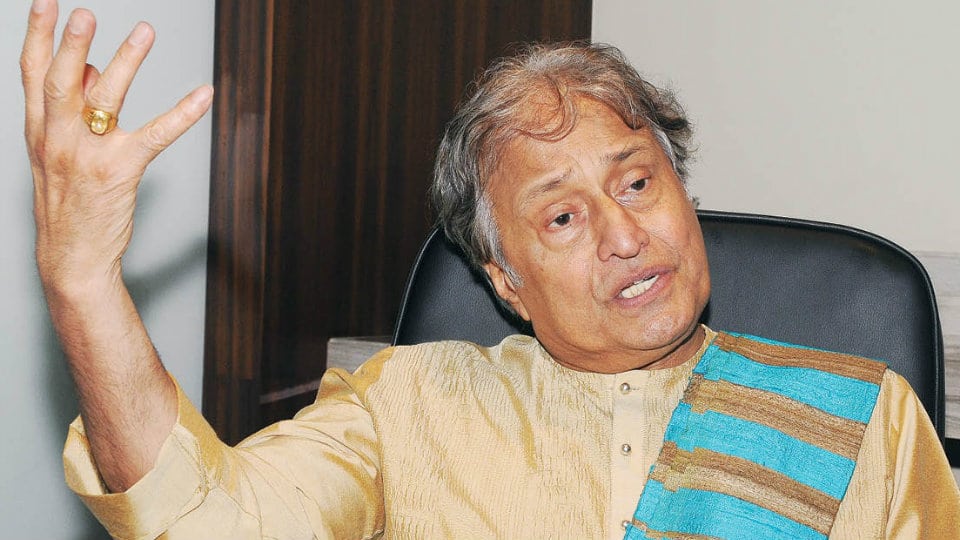
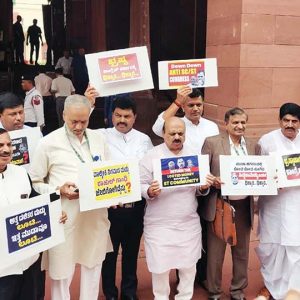
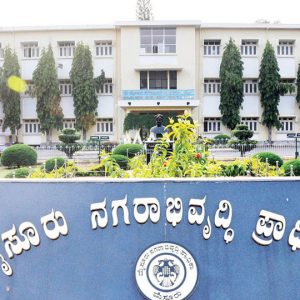
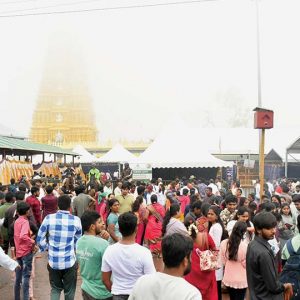
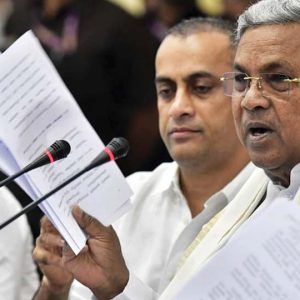
Recent Comments